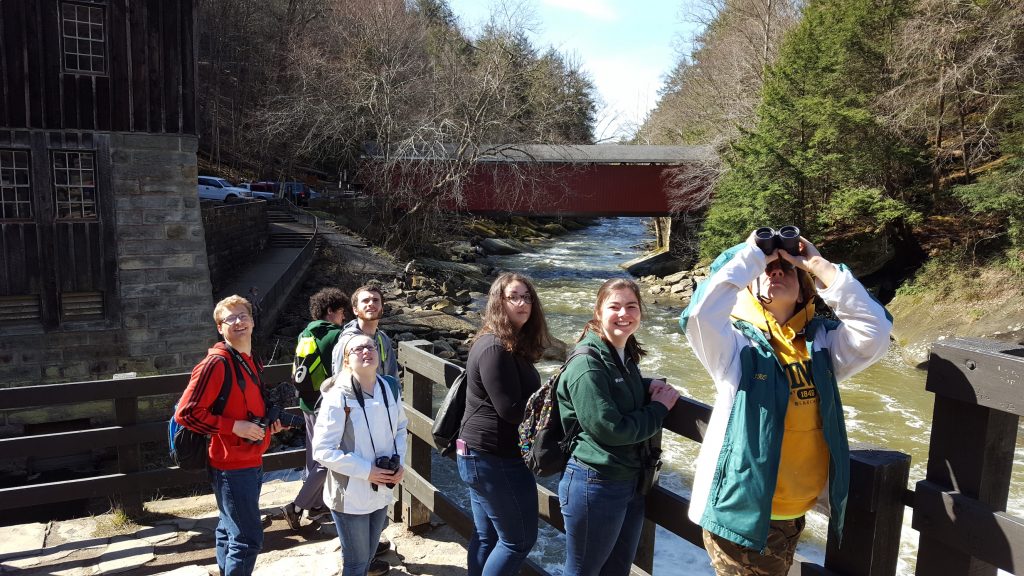Together, We Succeed.
Saint Vincent Ornithology Course Offerings

Welcome to the first post on Ornithology at Saint Vincent College! When I first saw the job ad for a professor position in the Department of Biology in 2007, I was happy to note that the Department was seeking someone to teach an Ornithology course. Only 32% of colleges like ours offer a course specifically geared toward the biology of birds (1). I had been studying birds all through high school, college, and graduate school, so it was natural for me to be attracted to this position.
Since 2007, I have offered the Ornithology course every other year to upper-level Biology and Environmental Science majors. The 3-hour weekly class meetings integrate both lecture and lab activities, and students tell me the highlights for them are the field trips and class discussions of scientific literature.
I was content with just that one course for a long time, since enrollment in the course usually came close to capacity but never required a waiting list. Then something exciting happened in 2017. A Saint Vincent College alumnus named Jim Wilson C’72 called me out of the blue and encouraged me to send some students to New Jersey Audubon’s World Series of Birding, a competition held at Cape May, NJ, at the peak of the spring migratory season. I took three students, and it was the highlight of their college career. I now offer a 1-credit course every spring that helps students prepare for the yearly competition. The class meetings involve learning to identify 200 species of birds by sight and sound, and I offer several 15-hour Saturday field trips to put their skills into practice. Enrollment has steadily climbed each year, and I now have 14 students (maximum capacity) signed up for Spring 2022. The fun of my World Series of Birds course now acts as a gateway into my fun-but-more-rigorous Ornithology course, since students who sign up for one end up coming back for more.
There is one problem, though. Not all students who enroll in the World Series of Birds course are science majors, so if they wanted to take Ornithology, they wouldn’t have the prerequisites. For the students who want to learn more about birds but are pursuing something different for a career, I developed a new course in 2020 that I called “Biology of Birds.” It would be similar to my Ornithology course but it would be open to anyone. It was to be offered in-person during the summer, but then the pandemic hit and I quickly converted it to an asynchronous online course. Doing field activities as a group was impossible given the online nature of the class, so I devised some at-home assignments for my students to do. I couldn’t assume my students had their own binoculars to use, so I took pairs from the Biology Department’s collection and mailed them to each student’s home. I look forward to offering this course in-person for the first time this coming spring.
Course Descriptions
BL-103 WORLD SERIES OF BIRDS
The World Series of Birding is a competition held by the Audubon Society in New Jersey during mid-May of each year. Teams from around the world compete to find the most bird species in a single 24-hour period. In preparation for the event, students will be introduced to the identifying characteristics of about 12 species per weekly meeting, with the expectation that they learn 150+ species by the end of the semester. Attendance on one 15-hour Saturday field trip is required, plus the actual competition held at the end of the semester. The team will arrive in Cape May, New Jersey, two days before the competition in order to refine skills and scout locations. The extended weekend trip close to graduation makes it difficult for seniors to participate. This is a Service Learning course in which our team works with others to collect scientifically valuable data on bird migration and distributions. Students enrolling in this course need not have prior birding experience, but enthusiasm is essential. One credit.
BL-230 ORNITHOLOGY
For thousands of years people have marveled at the beauty, the diversity, and the abilities of birds, particularly their ability to fly. Feathers are unique to birds, and birds are also known for their migratory behavior, singing ability, and parental care. While this course will cover these topics in depth, we will also examine how the study of birds can generate new insights relating to issues affecting all animals, including the nature of intelligence, communication, evolution, and ecological interactions. Class periods will feature lecture, multimedia demonstrations, and discussion of scientific literature. There will be a significant number of field trips to observe, identify, and capture birds in their native habitats. Prerequisites: BL 150-153. Spring semester, even-numbered years. Three credits.
NSCI-107 THE BIOLOGY OF BIRDS
This course provides an introduction to ornithology, the study of birds. Lecture topics include the evolutionary history of birds from dinosaur ancestors; avian anatomy and physiology; the physics of bird flight; patterns of migration; reproductive cycles and behavior; and how birds set up territories, find food, and avoid predators. Each class will obviously be filled with avian examples, but the general concepts learned may be applied to other animals, as well. Lab sessions include dissection of preserved specimens, capture and release of live birds, bird feeder observations, bird song experiments, and bird identification skills. Student learning will be assessed through tests, reading assignments, lab reports, and a class presentation. Offered even-numbered years, spring semester. Four credits.
Endnotes
- Saint Vincent has compiled a list of 34 peer institutions for comparative purposes, and as of Nov. 2021, I found that 11 offered some kind of course in ornithology or the biology of birds.
This article is written by Dr. Jim Kellam, Associate Professor of Biology at Saint Vincent College.

